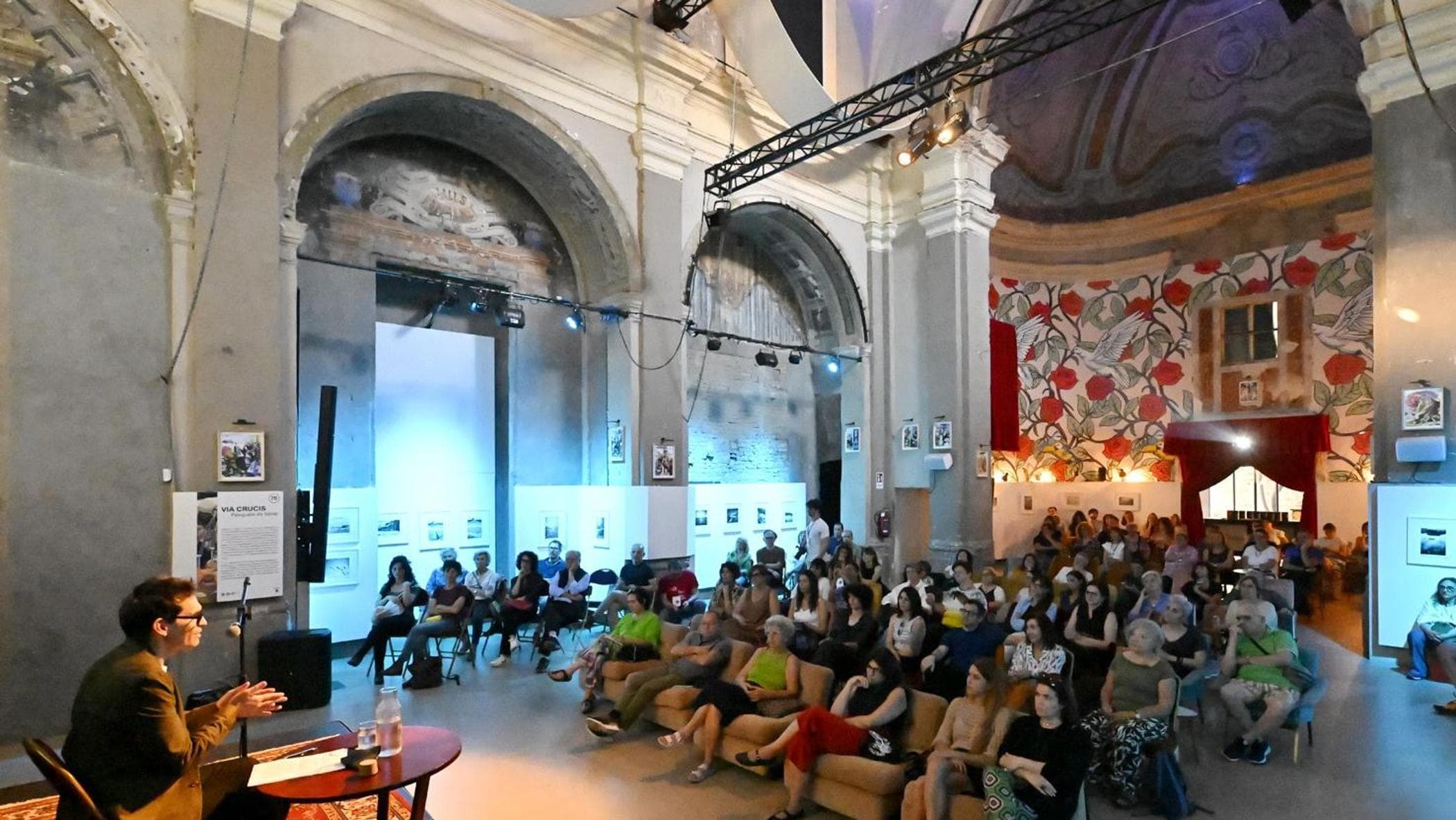“This is what I thought” – says Antoine Roquentin in Sarte’s Nausea. “Because the most common event to become an adventure, it is necessary and sufficient for us to begin to count.”
The special alchemy that arises when a story takes shape in a story, in a plot of words heard or read, shone in the lesson-show that Nicholas Lagioia (Premio Strega cu La ferocia in 2015, editorial director of the Turin Book Fair for eight years) offered on Friday evening to the public from the stage of Colonne Ventotto, a church deconsecrated to be consecrated to the rite of art
Summoning poets and storytellers as witnesses, from Homer to Walter Siti, via Pessoa, Svevo, Nabakov, Flaubert and Kafka, restless and unsettling guests evoked each time their voices come to life thanks to the act of reading, the ‘writer, guest of the X. edition of Festival of slowness with the lectio magistralis I will soon know who I am, he opened his digression through almost three thousand years of the art of narration, reminding that “literature remains one of the most sophisticated and profound tools of communication, of putting spirit in contact and spirit. , burns in an instant distance.”
And so, while he recites the verses of Veglia, written by Ungaretti Returning from a night next to the slaughtered body of a friend, the secular miracle of poetry takes place, as the writer testifies: “When I recited this poem, my mind joined the mind of the young poet who Christmas Eve 1915, Mr. Carso composed them”. Faced with the evil of war, the horror and the mystery of death, “Ungaretti performs the artistic operation par excellence: he gives form to what has no form in us, to chaos, despair, loneliness and fear”. This possibility is proposed by the tools of a language that names things in a concrete way, excavating the words because “every word deleted is an additional emotion in the reader”.
Literature, therefore, was born with an anti-Platonic vocation because it is the art of the concrete and not of abstract ideals: “The poet never starts from a universal but always from the particular: literature is not interested not to jealousy in itself, but to the poet. in jealousy of Othello who was in love with Desdemona. Literature, like the devil, is in the details.”
When was literature born? “As he observed Nabokov, was born when a boy ran away from a crying wolf while there was no wolf chasing him, and the inhabitants of the valley believed him.” Nabokov, who was an entomologist, in his lectures on literature “invited writers – charmers and shamans – not to be afraid to dress up, since the greatest master of disguises is nature itself.” While “politics is the art of lying passed as truth, literature is the art of truth passed on as lies.”
Of course, to be able to make a fiction believable, the writer “needs to have a descriptive ability: if a wolf cries, then one must be able to say what the wolf looks like.” But the descriptive ability is not enough: “The writer must also be able to simulate a feeling like an actor when he immerses himself in a character. He expresses this shamanic characteristic in a few lines Fernando Pessoa for whom the poet is a pretender who pretends so completely that he manages to pretend that the pain he really feels is pain.”
Since for Hemingway the writer must write only about what he experienced (“Easy for someone who fought, participated in the bullfight in Spain and in the 1920s was in the Paris of Breton, Duchmap and Picasso!”), for Walter Sites “You must not have experienced what you say, but you must have deserved it.” To give shape to a character, the writer must bravely enter into himself: “Dostoevsky He must not have killed in order to be able to write Crime and Punishment, but he must find the murderer in him as Manzoni must go to take Don Abbondio, with his fears, in him.”
What is the use of a poem, of a novel? “Literature is never a call to arms, it does not rally the crowd. Be careful if you want to necessarily give a practical function to literature.” When a Eduardo De Filippo they asked what was the message of one of his plays, he answered: “If I wanted to bring a message, I would have been a postman and not a playwright”, Lagioia remembers.
If it is not communication or revelation of a message, if it does not have the power to change the course of history or prevent its horror”, literature, as he wrote Kafka, can be an ax to break the frozen sea that is inside us. It is also thanks to the great poets and writers that we can continue to recognize ourselves as humans despite the disasters committed by our species.”

